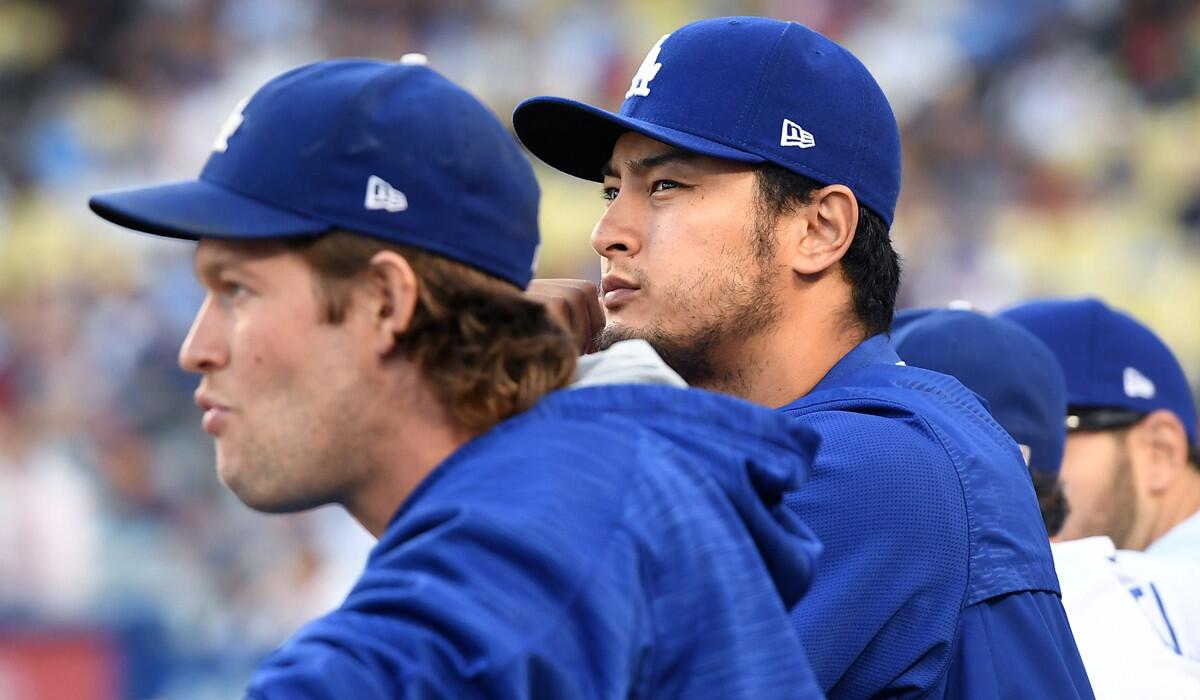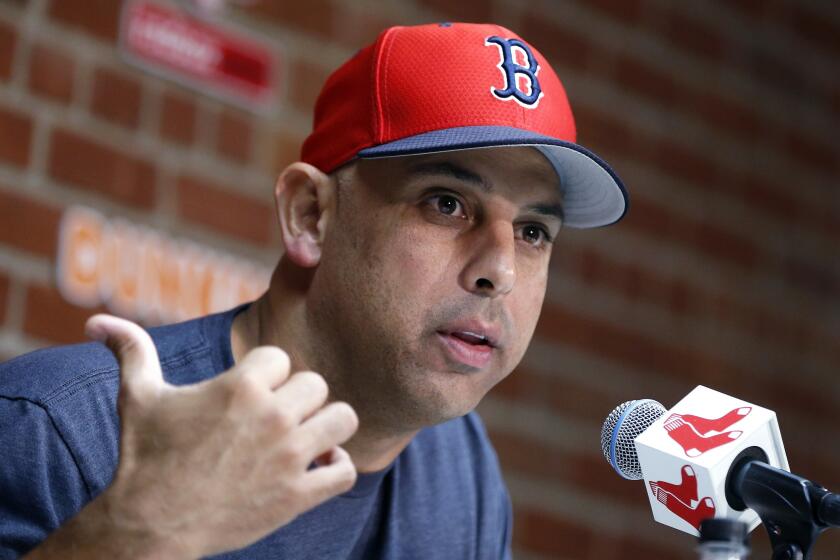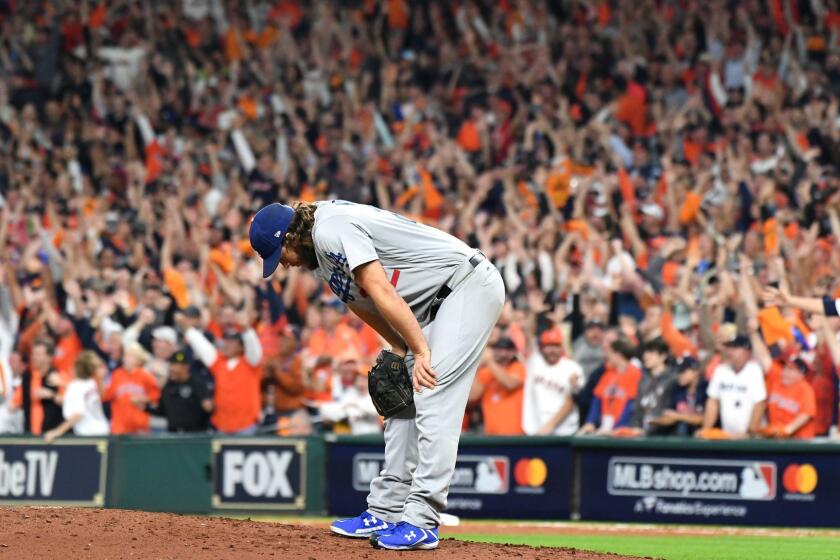Legacies of Clayton Kershaw and Yu Darvish irreparably tarnished by Astros’ cheating

- Share via
Baseball was simpler then.
Before the disclosures about how the Houston Astros used electronic devices to steal signs, before the infractions cost their manager and general manager their jobs, Yu Darvish was a choker.
Period.
The day after the Dodgers were defeated by the Astros in Game 7 of the 2017 World Series, a column appeared in this newspaper that read in part, “Darvish did the unimaginable and inexcusable, following one historically atrocious start with another. . . . “
I remember that column well. I wrote it.
And there was more.
When then-Dodgers catcher Yasmani Grandal allowed two passed balls, was called for catcher’s interference and committed an error in Game 1 of the National League Championship Series against the Milwaukee Brewers the following year, I described him as “Yu Darvish behind a catcher’s mask.”
Last season, the day before Darvish pitched his first game at Dodger Stadium since his $126-million move to the Chicago Cubs, I wrote how “his name remains synonymous with failure.”
Ugh.
The Boston Red Sox parted ways with manager Alex Cora, whose involvement in the Astros’ sign-stealing scandal was deep. Players emerged unscathed, raising questions.
None of this was personal.
This was reality. Or so I thought.
Major League Baseball’s investigation into the Astros confirmed they employed a sign-stealing scheme in their championship season, revealing that what were once considered hard truths were nothing more than premature conclusions.
Over the last couple of days, I’ve spoken to several other reporters who covered the 2017 World Series. We wondered how much of what we wrote could retroactively be reclassified as fiction. But never mind us.
The conversations were reminders of the reputations damaged by the events of that series.
The Dodgers pitchers who were diminished in defeat should be viewed more charitably now that MLB’s findings are public. Unfair as it is, however, their names will never be completely cleared. The stigmas remained with them in the years that followed, affecting how they were perceived, how they were treated, even how they thought of themselves. All of that became part of their public profile. Most of the harm inflicted can’t be undone.
Darvish wasn’t alone.
Clayton Kershaw pitched spectacularly in the opening game of that series at Dodger Stadium, but couldn’t hold separate four- and three-run leads in a Game 5 loss at Minute Maid Park, where the cheating occurred.
If the Dodgers had won Game 5 and the series, Kershaw’s previous postseason defeats would have become part of an inspirational story about how his perseverance helped the Dodgers end a 29-year championship drought.
What lessons need to be learned by high school athletes after Astros’ scandal?
Instead, the Game 5 loss became further evidence the greatest pitcher of his generation was psychologically predisposed to falter in the postseason.
The thought entered Kershaw’s mind, at least to some degree. After his failed relief appearance contributed to the Dodgers’ elimination from the playoffs in 2019, Kershaw conceded, “Everything people say is true right now about the postseason.”
There was also Kenley Jansen.
Jansen is the franchise’s all-time saves leader, but the majority of fans have missed a significant percentage of his regular-season heroics because of the Dodgers’ citywide television blackout. People only remember what they see and what they saw Jansen do is heartbreaking. He blew a save in a Game 2 loss in the 2017 World Series and was the pitcher of record in the Game 5 defeat.
If Jansen had recorded the final out of the 2017 World Series, the moment would have made him one of the most beloved relievers, if not the most beloved, in franchise history. Instead, he was subjected to boos last season when his abilities declined.
And there were others.
But no one was affected as much as Darvish.
The Japanese right-hander was defined almost entirely in this country by his performance in the 2017 World Series. He registered only five outs in a Game 3 loss at Minute Maid Park. He did the same in the Game 7 defeat at Dodger Stadium.
From the outside, what happened appeared to be clear: Darvish withered under the bright lights. The perception of him being a soft player followed him to Chicago. In a miserable injury-plagued first season with the Cubs, team management questioned whether he was really hurt. (He was. An MRI examination in August showed he developed a stress reaction in his throwing elbow.)
The Dodgers were cheated out of the 2017 World Series title. This is fact after an MLB investigation said the Astros used technology to cheat and beat L.A.
There was more to the story.
On the day of the Dodgers’ postseason opener in 2018, The Times ran a 5,494-word story about Game 5 of the World Series the previous year. More than two dozen players, coaches, executives and broadcasters were interviewed for the piece. Not one of them mentioned the possibility of the Astros stealing signs.
The truth emerged only because of an interview former Astros pitcher Mike Fiers gave to the Athletic.
In the wake of Fiers’ confession, Darvish has shown no interest in revisiting the results, saying accepting his failure and overcoming his disappointment is what made him the person he is today. While expressing appreciation for how Dodgers fans have sent him messages over social media platforms to apologize for how they treated him, he has insisted such gestures are unnecessary.
The grace Darvish has exhibited has gained him widespread admiration. But whatever praiseworthy qualities he has demonstrated as a person, he still isn’t known as a champion on the field.
The Astros stole that from him when they stole his signs.
More to Read
Are you a true-blue fan?
Get our Dodgers Dugout newsletter for insights, news and much more.
You may occasionally receive promotional content from the Los Angeles Times.













